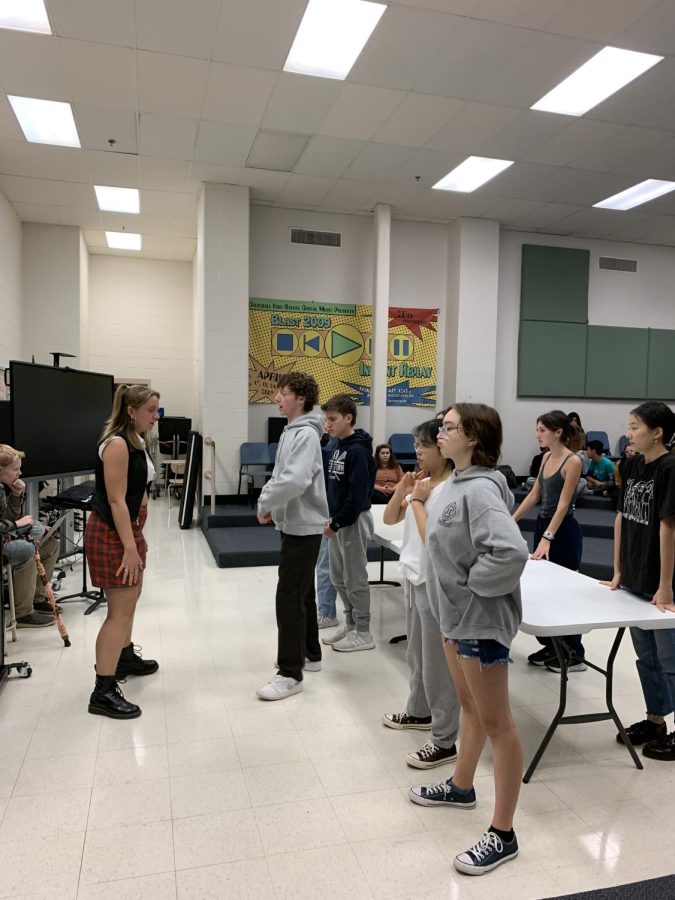Behind the Scenes of the WCHS Fall Musicial: “Matilda”
Choreographers Ian Rubin and Aliya Primich lead dance rehearsal in the chorus room with the cast members playing the main children in “Matlida” in preparation for the performances this November.
October 20, 2022
Soft chatter from the cast members of “Matilda” floats throughout the chorus room, harmonizing with gentle hums from Olga, the portable air conditioner in the corner. Chilly and charged, the room’s atmosphere settled as Diego Gutierrez, a WCHS senior, clapped his hands, calling for attention.
“What’s most important to me is that the story comes across,” Gutierrez said. “If I do not see the story and art presented, I will change it.”
Matilda is a story about a girl with dumbfounding intelligence and psychokinetic powers working with her teacher to provide justice for her school. As the Student Director, Gutierrez’s role in the production of “Matilda” is crucial. From casting, blocking, coordinating with the technical (tech) crew and managing logistics, he embodies the core principle of the WCHS Art Department: student initiative.
“The technical theater students are creating the set themselves,” director Ms. Kieval said. “There is massive student buy-in to the production, which is amazing to see.”
In “Matilda,” as well as most other WCHS productions, Kieval, and other teachers—Matthew Albright and Benjamin Schnapp, who lead music and tech respectively—act as guiding figures. Oftentimes, they manage the logistics, provide a framework and guidelines and act as an organizing, unifying authority. Working in tandem with student leaders like Gutierrez, they strive to build a show that is not just stage-ready, but one that displays the full potential of the story.
“It’s more than just a couple of ‘theater kids’ on stage,” WCHS junior Hannah Choi, who plays Lavender, said. “There is tech that builds the sets, costumes and makeup, props and producers and directors.”
In many regards, the WCHS tech crew, headed by WCHS senior and Student Technical Director, Spencer Swetlow, is the backbone of these productions. Without them, the stage would be barren—devoid of intricately designed sets and stripped of carefully balanced sound and lighting cues. In “Matilda” specifically, the ‘static,’ or fixed set, is limited. This type of set has caused these specific designs to be far more involved, as almost every piece is a moving part.
“We have stayed until 11:30 p.m. before,” Swetlow said. “We spend more time with each other than with our own families, so tech becomes a second family.”
This familial connection expands beyond the tech crew. Through late nights, inconveniently timed rehearsals and the infamous “tech week”—the mandatory week of rigorous rehearsals before opening night, in which cast and crew practice the final product—every participant, no matter their role, bonds through their shared experiences. These relationships, forged through unique perspectives gained from theater, are often fueled even further through the actors’ interpretation of their characters. Actors make specific choices to portray a persona, oftentimes allowing actors to identify with their stories.
“My [character] has this internal conflict throughout the show with her self-esteem and her confidence, and I feel like I’ve had those moments in my life, so I can live them through her,” WCHS junior Lauren Curtiss, who plays Miss Honey, said.
Involvement in all aspects of theater can also impart lessons about personal and interpersonal environments. The capacity of storytelling and performance can convey messages in a subtle manner. Whether finding true friends, discovering lifelong passions or learning to collaborate, theater is powerful.
“I’ve also learned to not care what people think,” Choi said. “Theater can be really embarrassing sometimes, so I have to be able to tune out what other people think to be able to do it.
Performance is a diverse art form, filled with a multitude of iterations and interpretations. Still, theater is a highly stigmatized form of expression. When one enters a stage, telling the story of someone else as their own requires confidence that can be difficult to muster up. With every sideways glance or dismissive comment, cast and crew call for a more empathetic audience, one that is aware of what it takes to produce a show.
“I think that if people approached theater with an open mind, they would be a lot more receptive to the art we put on the WCHS stage,” Gutierrez said.
With an open mind and an open heart, the cast and crew of “Matilda” urge WCHS students to come out to see the fruits of their efforts. This musical tells a story beyond Matilda’s psychokinesis and book smarts; it tells the heartwarming tale of the fractured life of a young, lost girl finding strength in her identity and in her chosen family.
“This show is for everyone. If you have ever felt like something wasn’t fair in life, this show is for you,” Kieval said.



